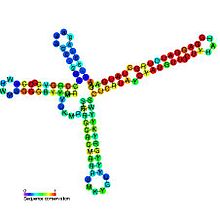| Repression of heat shock gene expression (ROSE) element | |
|---|---|
 Predicted secondary structure and sequence conservation of ROSE Predicted secondary structure and sequence conservation of ROSE | |
| Identifiers | |
| Symbol | ROSE |
| Rfam | RF00435 |
| Other data | |
| RNA type | Cis-reg; thermoregulator |
| Domain(s) | Bacteria |
| SO | SO:0000204 |
| PDB structures | PDBe |

The repression of heat shock gene expression (ROSE) element is an RNA element found in the 5' UTR of some heat shock protein's mRNAs. The ROSE element is an RNA thermometer that negatively regulates heat shock gene expression. The secondary structure is thought to be altered by temperature, thus it is an RNA thermometer. This structure blocks access to the ribosome binding site at normal temperatures. During heat shock however, the structure changes freeing the ribosome binding site and allowing expression to occur.
A partial structure of this RNA element has been determined using NMR.
ROSE1 and ROSEAT2
ROSE1 and ROSEAT2 are specific examples of ROSE elements. ROSE1 is found in Bradyrhizobium japonicum whereas ROSEAT2 is a closely related element from Agrobacterium tumefaciens. The two RNA elements have similar secondary structures with ROSE1 having an extra hairpin. All ROSE elements contain a characteristic 'bulged G' opposite the Shine-Dalgarno sequence binding site, without this nucleotide the RNA thermometer loses its temperature-sensitivity.
IpbA
Expression of the heat shock protein IpbA in species of Pseudomonas is controlled by a ROSE-type RNA thermometer. This thermometer only consists of two hairpins. It inhibits translation of IpbA at low temperatures and permits translation when temperature increases.
rhlA and lsdI ROSE-like elements
Pseudomonas aeruginosa quorum sensing-dependent virulence factors can be thermoregulated. ROSE thermometer present in the 5'UTR of rhlA and ROSE-like thermometer in the 5'UTR of lasI block the translation at lower temperatures.
See also
References
- ^ Chowdhury S, Maris C, Allain FH, Narberhaus F (2006). "Molecular basis for temperature sensing by an RNA thermometer". EMBO J. 25 (11): 2487–2497. doi:10.1038/sj.emboj.7601128. PMC 1478195. PMID 16710302.
- Nocker, A; Hausherr T; Balsiger S; Krstulovic NP; Hennecke H; Narberhaus F (2001). "A mRNA-based thermosensor controls expression of rhizobial heat shock genes". Nucleic Acids Res. 29 (23): 4800–4807. doi:10.1093/nar/29.23.4800. PMC 96696. PMID 11726689.
- Balsiger, S; Ragaz C; Baron C; Narberhaus F (2004). "Replicon-Specific Regulation of Small Heat Shock Genes in Agrobacterium tumefaciens". J Bacteriol. 186 (20): 6824–6829. doi:10.1128/JB.186.20.6824-6829.2004. PMC 522190. PMID 15466035.
- ^ Narberhaus F, Waldminghaus T, Chowdhury S (January 2006). "RNA thermometers". FEMS Microbiol. Rev. 30 (1): 3–16. doi:10.1111/j.1574-6976.2005.004.x. PMID 16438677.
- Nocker A, Hausherr T, Balsiger S, Krstulovic NP, Hennecke H, Narberhaus F (December 2001). "A mRNA-based thermosensor controls expression of rhizobial heat shock genes". Nucleic Acids Res. 29 (23): 4800–4807. doi:10.1093/nar/29.23.4800. PMC 96696. PMID 11726689.
- Krajewski, SS; Nagel, M; Narberhaus, F (2013). "Short ROSE-Like RNA Thermometers Control IbpA Synthesis in Pseudomonas Species". PLOS ONE. 8 (5): e65168. Bibcode:2013PLoSO...865168K. doi:10.1371/journal.pone.0065168. PMC 3669281. PMID 23741480.
- Grosso-Becerra, María Victoria; Croda-García, Gerardo; Merino, Enrique; Servín-González, Luis; Mojica-Espinosa, Raúl; Soberón-Chávez, Gloria (2014-10-28). "Regulation of Pseudomonas aeruginosa virulence factors by two novel RNA thermometers". Proceedings of the National Academy of Sciences of the United States of America. 111 (43): 15562–15567. Bibcode:2014PNAS..11115562G. doi:10.1073/pnas.1402536111. ISSN 1091-6490. PMC 4217398. PMID 25313031.
Further reading
- De La Fuente, M.; Valera, S.; Martínez-Guitarte, J. L. (2012). "NcRNAs and thermoregulation: A view in prokaryotes and eukaryotes". FEBS Letters. 586 (23): 4061–4069. doi:10.1016/j.febslet.2012.10.018. PMID 23098758.
External links
This molecular or cell biology article is a stub. You can help Misplaced Pages by expanding it. |